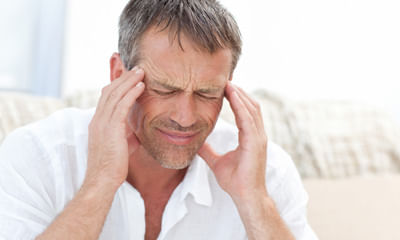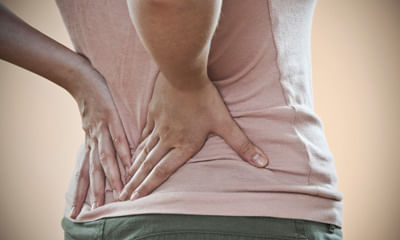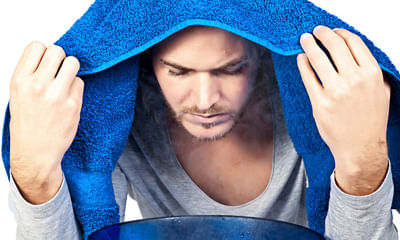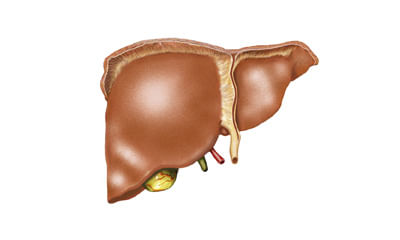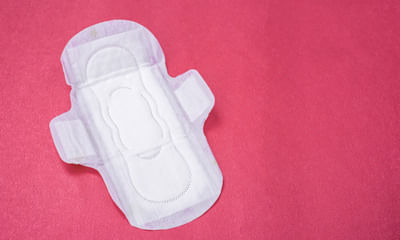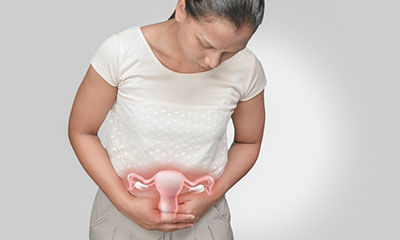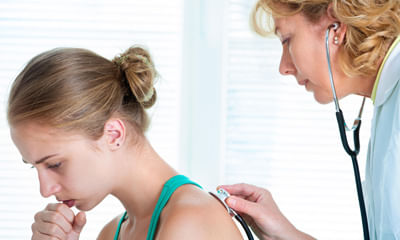Abdominal Pain Nausea Fatigue
For the past two weeks I have pain in back of my head and above ears on the forehead due to which I am unable to concent ...
Ask Free Question
Physical exercise aerobic activity for 20–30 minutes 5 days a week improves cardiovascular health. If injured, pursuing an activity that avoids the injured muscle group or joint can help maintain physical function while recovering. Stress management pursuing an enjoyable activity or verbalising frustration to reduce stress and improve mental health. Relaxation techniques deep breathing, meditation, yoga, rhythmic exercise and other activities that reduce symptoms of stress hydrotherapy using water to relieve pain, treat diseases and maintain health. For example, mineral baths and hot tubs. Stretching stretching exercises can improve flexibility and improve physical function. Graded exercise therapy physical exercise that starts very slowly and gradually increases over time. Massage relaxes tense muscles. Heat therapy using heat is an excellent way to help relax muscles and encourage blood flow to areas that are particularly painful. This can easily be done at home using dry or damp hot towels. Simply hold the towel against the affected area until you feel relief. Ultrasound an ultrasound uses sound waves to produce heat which improves blood flow to deep muscle tissue. It can be used to relieve pain, stiffness, spasms, and inflammation widespread muscle pain and tenderness. Symptoms requires a medical diagnosis widespread muscle pain and tenderness are the most common symptoms. People may experience: pain areas: in the muscles, abdomen, back, or neck pain types: can be chronic, diffuse, sharp, or severe pain circumstances: can occur at night gastrointestinal: constipation, nausea, or passing excessive amounts of gas whole body: fatigue, feeling tired, or malaise muscular: muscle tenderness, delayed onset muscle soreness, or muscle spasms sensory: pins and needles, sensitivity to cold, or sensitivity to pain mood: anxiety, mood swings, or nervousness sleep: difficulty falling asleep or sleep disturbances cognitive: forgetfulness or lack of concentration hand: sensation of coldness or tingling also common: depression, flare, headache, irritability, joint stiffness, painful menstruation, or tingling feet.
From 4-5 year I have 24 hour full body pain and fatigue and all tests are normal. 4-5 months ago aiims doctor diagnosed ...
Ask Free Question
Also called: fibrositis self-carephysical exercise aerobic activity for 20–30 minutes 5 days a week improves cardiovascular health. If injured, pursuing an activity that avoids the injured muscle group or joint can help maintain physical function while recovering. Stress management pursuing an enjoyable activity or verbalising frustration to reduce stress and improve mental health. Relaxation techniques deep breathing, meditation, yoga, rhythmic exercise and other activities that reduce symptoms of stress hydrotherapy using water to relieve pain, treat diseases and maintain health. For example, mineral baths and hot tubs. Stretching stretching exercises can improve flexibility and improve physical function. Graded exercise therapy physical exercise that starts very slowly and gradually increases over time. Massage relaxes tense muscles. Heat therapy using heat is an excellent way to help relax muscles and encourage blood flow to areas that are particularly painful. This can easily be done at home using dry or damp hot towels. Simply hold the towel against the affected area until you feel relief. Ultrasound an ultrasound uses sound waves to produce heat which improves blood flow to deep muscle tissue. It can be used to relieve pain, stiffness, spasms, and inflammation widespread muscle pain and tenderness. Symptoms requires a medical diagnosis widespread muscle pain and tenderness are the most common symptoms. People may experience: pain areas: in the muscles, abdomen, back, or neck pain types: can be chronic, diffuse, sharp, or severe pain circumstances: can occur at night gastrointestinal: constipation, nausea, or passing excessive amounts of gas whole body: fatigue, feeling tired, or malaise muscular: muscle tenderness, delayed onset muscle soreness, or muscle spasms sensory: pins and needles, sensitivity to cold, or sensitivity to pain mood: anxiety, mood swings, or nervousness sleep: difficulty falling asleep or sleep disturbances cognitive: forgetfulness or lack of concentration hand: sensation of coldness or tingling also common: depression, flare, headache, irritability, joint stiffness, painful menstruation, or tingling feet treatment consists of self care and therapy medication, talk therapy and stress reduction may help in controlling the symptoms. Self-carephysical exercise aerobic activity for 20–30 minutes 5 days a week improves cardiovascular health. If injured, pursuing an activity that avoids the injured muscle group or joint can help maintain physical function while recovering. Stress management pursuing an enjoyable activity or verbalising frustration to reduce stress and improve mental health. Relaxation techniques deep breathing, meditation, yoga, rhythmic exercise and other activities that reduce symptoms of stress therapies support group a forum for counseling and sharing experiences among people with a similar condition or goal, such as depression or weight loss. Biofeedback controlling the body's heartbeat, brainwaves, breathing and blood pressure by monitoring them with sensors. Cognitive behavioral therapy a talk therapy focused on modifying negative thoughts, behaviours and emotional responses associated with psychological distress. Hydrotherapy using water to relieve pain, treat diseases and maintain health. For example, mineral baths and hot tubs. Chiropractic treatment techniques adjusting the spine and massaging the back muscles to relieve pain. Stretching stretching exercises can improve flexibility and improve physical function. Graded exercise therapy physical exercise that starts very slowly and gradually increases over time. Massage relaxes tense muscles. Acupuncture insertion of needles into specific points on the body to relieve pain and treat other conditions. A form of traditional chinese medicine. Medications selective serotonin reuptake inhibitor (ssri) eases symptoms of depressed mood and anxiety. Analgesic relieves pain. Nonsteroidal anti-inflammatory drug relieves pain, decreases inflammation and reduces fever. Nerve pain medication blocks pain caused by damaged nerves. Muscle relaxant reduces muscle tension and helps relieve muscle pain and discomfort. Fibromyalgia medications can help reduce the pain of fibromyalgia and improve sleep. Common choices include: •pain relievers. Over-the-counter pain relievers such as acetaminophen (tylenol, others), ibuprofen (advil, motrin ib, others) or naproxen sodium (aleve, others) may be helpful. Your doctor might suggest a prescription pain reliever such as tramadol (ultram). Narcotics are not advised, because they can lead to dependence and may even worsen the pain over time. •antidepressants. Duloxetine (cymbalta) and milnacipran (savella) may help ease the pain and fatigue associated with fibromyalgia. Your doctor may prescribe amitriptyline or the muscle relaxant cyclobenzaprine to help promote sleep. •anti-seizure drugs. Medications designed to treat epilepsy are often useful in reducing certain types of pain. Gabapentin (neurontin) is sometimes helpful in reducing fibromyalgia symptoms, while pregabalin (lyrica) was the first drug approved by the food and drug administration to treat fibromyalgia. Therapy a variety of different therapies can help reduce the effect that fibromyalgia has on your body and your life. Examples include: •physical therapy. A physical therapist can teach you exercises that will improve your strength, flexibility and stamina. Water-based exercises might be particularly helpful. •occupational therapy. An occupational therapist can help you make adjustments to your work area or the way you perform certain tasks that will cause less stress on your body.
Can any one explain me about malarial fever completely its causes symptoms stages of progression etc. ...
Ask Free Question
symptoms : Fever Chills General feeling of discomfort Headache Nausea and vomiting Diarrhea Abdominal pain Muscle or joint pain Fatigue Rapid breathing Rapid heart rate Cough.
Hello doctor. What are the symptoms that show my liver is sinking. Please tell what happens when liver starts to fail? ...
Ask Free Question
When the liver starts to fail one would have symptoms such as jaundice, change in mental state, fatigue, blood in the stool, nausea, diarrhea, appetite loss, pain in abdominal, feeling of extreme tiredness etc.
I am a female of 24 years old. I have persistent abdominal pain, gastrointestinal issues like bloating, constipation, bu ...
Ask Free Question
In majority of cases type of cyst can not be predicted with surity. However mri may help. You need to meet gynecologist, gastro-enterologist and physician for your complaints.
Hello doc. I have pcos and was put on krimson 35 for 1st time on 14th feb (7 days after last period- mid cycle) and I to ...
Ask Free Question
As you said, this could be either. There is not much that can be done right now. Wait for one week or 10 days. If periods have still not come, do a urine pregnancy test.
I am 25 years old female. I’ve been passing bright red blood and mucus for about 2-3, most of the time without any stool ...
Ask Free Question
Your passing bright red blood and mucus for about 2-3, most of the time without any stool and other symptoms. Homeopathy has very effective treatment for your problem. No side effects. Please take homeopathic medicine, preliminary dose, arsenic album 200-once daily in the morning for 5 days. Book online appointment/consultation with me -(commencing from text consult rs 149, audio/ phone-rs 300) for further more comprehensive prescription and treatment.
I'm a 24 y.o female. I've severe headache probably migraine since 2 years which do not subside for days if I don't take ...
Ask Free Question
Please check your thyroid profile first usg lower abdomen till that time take five phos 4 tablets twice daily drink water according to your thirst only.
Is vomiting an allergic reaction to the covishield vaccine. Can I take the second dose? ...
Ask Free Question
Some mild symptoms aefis may occur like injection site pain, headache, fatigue, fever, body ache, abdominal pain, nausea and vomiting, dizziness-giddiness, tremor, sweating, cold, cough and injection site swelling. No other vaccine-related serious adverse effects have been reported. Let's connect over a call so that we can discuss your concern in details and make a suitable treatment plan for you.
After having unprotected sex I took ipill within 24 hrs and on the 6th day after that I experienced withdrawal bleeding ...
Ask Free Question
No. It can be because of infection. 1.You should maintain high grade of personal hygiene. 2.Do change your underclothes at least 2 times a day 3.Wear cotton under garments 4.Stay hydrated. Drink plenty of fluids. 5.Keep the area dry homeopathy is a very effective for this problem n has very encouraging results. And homeopathic medicines are safe and do not have any side effects at all.

